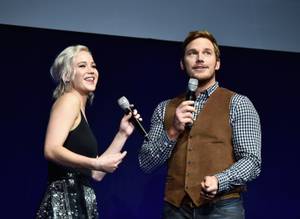
The Magnificent Seven Denzel Washington, Chris Pratt, Ethan Hawke. Directed by Antoine Fuqua. Rated PG-13. Opens Friday citywide.
Even if you’ve never seen the original 1960 version of The Magnificent Seven—or its inspiration, Akira Kurosawa’s Seven Samurai (1954)—you probably have a general idea what goes down. Seven badass dudes band together to save a small, peaceful town from a sadistic villain, each one demonstrating his own specialized variant of combat-related magnificence. It’s such a durable, almost foolproof scenario that not even a director as reliably ham-handed as Antoine Fuqua (Southpaw, Olympus Has Fallen, Shooter) can completely screw it up, though this fitfully exciting remake is unlikely to spawn three mediocre sequels, as its predecessor did.
If nothing else, the new version—set in post-Civil War America, rather than Mexico—reflects the country’s multicultural shift over the past half-century. Of the original seven, only Yul Brynner, with partly Eurasian ancestry, wasn’t glaringly white, whereas the 2016 crew includes an African-American (Denzel Washington), a Korean (Byung-hun Lee), a Mexican (Manuel Garcia-Rulfo) and a Native American (Martin Sensmeier). Chris Pratt, Ethan Hawke and Vincent D’Onofrio round out the bunch, who’ve been hired by a grieving widow (Haley Bennett) to protect the town of Rose Creek from a murderous industrialist named Bogue (Peter Sarsgaard, sneering up a storm). With Bogue and his men due to return to Rose Creek shortly, there’s precious little time for this ragtag assembly to get used to each other’s company, much less teach a village of frightened farmers how to defend themselves.
That’s basically it as far as story goes, which means it’s mostly up to the cast to entertain us. Washington is his usual commanding self as bounty hunter Sam Chisolm, though the decision to give his character a personal score to settle with Bogue undermines the somewhat altruistic theme that powered both the original and Seven Samurai. (Yes, they’re being paid, but not remotely enough to risk their lives.) Pratt has the most fun, getting to kill bad guys with elaborate card tricks; D’Onofrio gives the weirdest performance, speaking in a high-pitched rasp and behaving like a cross between Grizzly Adams and the Unabomber. Lee, Garcia-Rulfo and Sensmeier, meanwhile, barely make a collective impression, suggesting that Hollywood, for all its laudable efforts in the direction of diversity, still has a long way to go.
In the end, what’s most sorely missing here is a sense of grand adventure. Elmer Bernstein’s score provided that in the 1960 version, and composers James Horner (who died last year while working on this project) and Simon Franglen pay homage to Bernstein’s staccato earworm of a main theme, crafting variations that clearly suggest it without actually duplicating it. When the real thing plays over the closing credits, however, it’s the most rousing moment in the entire two-plus hours.







